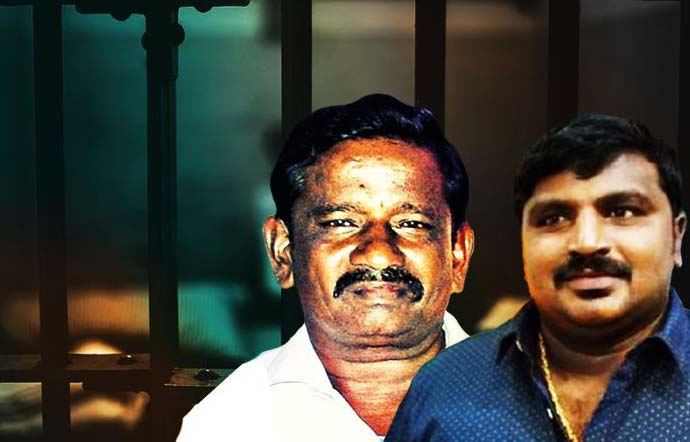
Image Courtesy: Live Law
The Madurai bench of the Madras High Court, on September 17, refused to grant bail to police inspector S Sridhar of Sathankulam police station accused in the custodial death of father-son, J. Benniks and P. Jeyaraj. The single judge bench of Justice V. Bharathidasan refused the bail on the ground that there were prima facie materials to reasonably believe that the petitioner committed the offence as also the reasonable apprehension that the witnesses are likely to be tampered with.
Background
On June 19, an FIR was lodged against the deceased father-son for allegedly violating lockdown restrictions and for misbehaving with police personnel. They were remanded to judicial custody and were kept in Sub-jail Kovilpatti where they died in a few days allegedly due to custodial torture. The doctors who conducted the autopsy concluded that both the deceased appeared to have died of complications of blunt injury sustained by them.
On June 26, the Madurai bench took suo moto cognizance of the incidents and directed the Judicial Magistrate to initiate enquiry. Subsequently, the Tamil Nadu government transferred the investigation of the case to the Central Bureau of Investigation (CBI).
The petitioner contended that he was not in the police station at the time of the incident and he was merely made an accused because he was the Station House Officer of the police station. He further contended that he did not instigate the other accused to torture the deceased. He also sought bail on medical grounds stating he needs medical assistance for a severe spinal cord injury.
The CBI objected to the bail petition and submitted that two eyewitnesses from the police station have given statements implicating the petitioner and several other witnesses have stated that the petitioner was present at the police station during the incident. It was also submitted that the petitioner is also known to have fabricated the FIR which was lodged against the deceased, subsequent to their arrest and that investigation is in progress and more evidence will likely come forward against the petitioner and hence, the bail should be denied. It was also submitted that the petitioner already has a case against him under section 307 of the IPC, proving his bad antecedents.
The court’s observations
The court observed that all the materials prima facie establish the involvement of this petitioner in the alleged crime. The court further pointed out that even though the custodial interrogation is over, the investigation is yet to be completed and if the petitioner is released on bail, there is high possibility that he would influence the other witnesses and also likely to tamper with the witnesses, especially, some of the witnesses are police personnel working in the same Police Station.
Further, the court considered the medical grounds raised for securing bail and observed that there was no material on record to establish any ailment of the petitioner.
The court then relied upon Prahlad Singh Bhati Vs. NCT, Delhi [2001 (4) SCC 280] whereby the apex court had observed, “The jurisdiction to grant bail has to be exercised on the basis of well settled principles having regard to the circumstances of each case and not in an arbitrary manner. While granting the bail, the court has to keep in mind the nature of accusations, the nature of evidence in support thereof, the severity of the punishment which conviction will entail, the character, behavior, means and standing of the accused, circumstances which are peculiar to the accused, reasonable possibility of securing the presence of the accused at the trial, reasonable apprehension of the witnesses being tampered with, the larger interests of the public or State and similar other considerations.”
The court’s order
The court, while denying bail to the petitioner observed thus,
“In the instant case, there are prima facie materials available on record to reasonably believe that the petitioner has committed the offence. That apart, considering the gravity of the offence, and also considering the position of the petitioner being an Inspector of Police, there is a reasonable apprehension that the witnesses are likely to be tampered with, especially, some of the witnesses are police personnel working in the same Police Station. Furthermore, the investigation is yet to be completed and it is at a crucial stage. Considering the above circumstances, I am not inclined to grant bail to the petitioner at this stage. Hence, the petitions stand dismissed.”
The complete order may be read here.
Related:
Custodial killings in Kerala: Deconstructing facts
“No place for encounter in a country governed by rule of law”: Justice Deepak Gupta